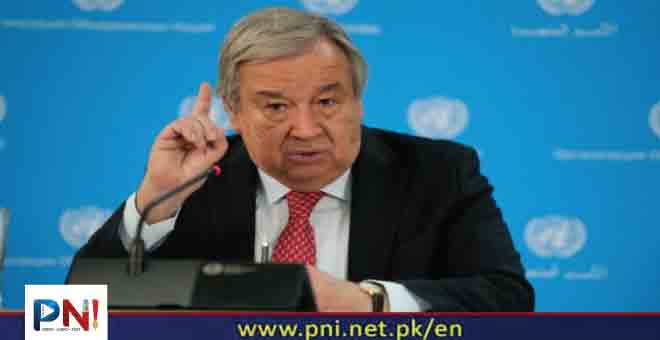UNITED NATIONS, Jun 24 (APP): The world must respond to the harm caused by the spread of online hate and lies while robustly upholding human rights, United Nations Secretary-General Antonio Guterres said Monday at the launch of the UN Global Principles for Information Integrity.
Speaking one year after the unveiling of his report into information integrity on digital platforms, the UN chief put forward a framework for coordinated international action to make information spaces safer and more humane, “one of the most urgent tasks of our time”.
“The spread of hatred and lies online is causing grave harm to our world,” he said, addressing the media at UN Headquarters, in New York.
The UN’s own humanitarian and peacekeeping operations are at risk, as its personnel deal with a “tsunami of falsehoods” and “absurd conspiracy theories”, the UN chief added.
False narratives and lies breed cynicism and undermine social cohesion and sustainable development, he said.
He asserted that everyone should freely express themselves without fear of attack and be able to access a wide range of views and information.
“No one should be at the mercy of an algorithm they don’t control, which was not designed to safeguard their interests, and which tracks their behavior to collect personal data and keep them hooked,” he said.
The Global Principles aim to empower people to demand their rights, help protect children, ensure honest and trustworthy information for young people, and enable public interest-based media to convey reliable and accurate information, Guterres added
The Principles evolved through wide-ranging consultations with UN member states, the private sector, youth leaders, media, academia and civil society.
They focus on building trust and resilience, ensuring an independent and pluralistic media, creating healthy incentives based on factual information, enhancing transparency and research, and empowering the public.
Key recommendations include urging governments, tech companies, advertisers, and media to avoid using or amplifying disinformation and hate speech. At the same time, governments should ensure timely access to information, support an independent media landscape, and protect journalists and civil society.
Tech companies should prioritize safety and privacy, apply consistent policies and support information integrity, especially around elections – while stakeholders involved in the development of artificial intelligence (AI) should ensure its safe, responsible and ethical deployment factoring in human rights.
Furthermore, tech companies should move away from business models that rely on algorithm-driven advertising and prioritize engagement above human rights. Instead, they should prioritize user privacy and safety.
Advertisers should demand transparency in digital advertising processes from the tech sector to help ensure they do not end up inadvertently funding disinformation or hateful messaging.
Tech companies and AI developers should also provide meaningful transparency, allow researcher access to data while respecting user privacy. Executives should also ensure independent audits and boost accountability.
Government, tech companies, AI developers and advertisers should take special measures to protect and empower children, with governments providing resources for parents, guardians and educators.
These recommendations stem from the Secretary-General’s 2021 report, ‘Our Common Agenda’, which outlines a vision for future global cooperation and multilateral action. They serve as a resource for member states ahead of the Summit of the Future, taking place in September.
Follow the PNI Facebook page for the latest news and updates.









